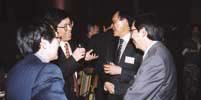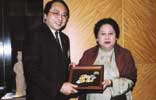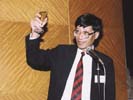|
Background
 The
mission of the Research Grants Council is to boost the quality of
research undertaken by the Hong Kong academic community, and to
support the development of fundamental and applied research to the
benefit of the community. The
mission of the Research Grants Council is to boost the quality of
research undertaken by the Hong Kong academic community, and to
support the development of fundamental and applied research to the
benefit of the community.
 Thanks
to the continued support of the Government and the University Grants
Committee (UGC), the Research Grants Council has been able to encourage
a diverse range of research projects. Thanks
to the continued support of the Government and the University Grants
Committee (UGC), the Research Grants Council has been able to encourage
a diverse range of research projects.
 The
pool of knowledge, created through these research projects, enables
many industry collaborative projects to forge ahead. In doing so,
Hong Kong is gaining an international reputation in the global research
community. The
pool of knowledge, created through these research projects, enables
many industry collaborative projects to forge ahead. In doing so,
Hong Kong is gaining an international reputation in the global research
community.
 A
number of funding sources supporting research in Hong Kong are available
but the main form of funding for academic research in the local
higher education sector is the Earmarked Research Grant (ERG) allocated
by the Council. A
number of funding sources supporting research in Hong Kong are available
but the main form of funding for academic research in the local
higher education sector is the Earmarked Research Grant (ERG) allocated
by the Council.
 The
ERG represents the main source of Government funding for competitive
academic research projects. It complements block grants from the
UGC, part of which provide institutions with funds for research
infrastructure and outlays such as researchers’ salaries, laboratory
costs and other overheads related to UGC or Council-funded research. The
ERG represents the main source of Government funding for competitive
academic research projects. It complements block grants from the
UGC, part of which provide institutions with funds for research
infrastructure and outlays such as researchers’ salaries, laboratory
costs and other overheads related to UGC or Council-funded research.
 Each
year, the Council’s main task is to consider applications and
approve grants from the fund. Total funding available for the ERG
2002-2003 was HK$543.3 million. Each
year, the Council’s main task is to consider applications and
approve grants from the fund. Total funding available for the ERG
2002-2003 was HK$543.3 million.
 The
Council would again like to place on record its gratitude to the
Government and the UGC for their continuing, generous support for
academic research in Hong Kong, enabling the Council to fund more,
though still not all, highly-rated research projects. The
Council would again like to place on record its gratitude to the
Government and the UGC for their continuing, generous support for
academic research in Hong Kong, enabling the Council to fund more,
though still not all, highly-rated research projects.

Allocation
of the Earmarked Research Grant: 2002-2003
How projects are selected
 The
Council’s objective is to support as many worthwhile research
projects as possible with the available funds. As in previous years,
the Council continued to uphold a high quality threshold for applications,
and to give larger and longer-term grants to quality research proposals. The
Council’s objective is to support as many worthwhile research
projects as possible with the available funds. As in previous years,
the Council continued to uphold a high quality threshold for applications,
and to give larger and longer-term grants to quality research proposals.
 The
overall success rate was 41%, similar to those in previous years
(compared with 43% in 2001-2002, and 39% in 2000-2001). The criteria
for the selection of research projects is detailed in Appendix
M. The
overall success rate was 41%, similar to those in previous years
(compared with 43% in 2001-2002, and 39% in 2000-2001). The criteria
for the selection of research projects is detailed in Appendix
M.
 Across
the board, equal emphasis is given to both fundamental and applied
research. Across
the board, equal emphasis is given to both fundamental and applied
research.
 Additionally,
the Council must be satisfied that the projects it funds have significant
intellectual and innovative content and serve the purpose of academic
development. The potential to apply the research is considered by
the Council in the allocation of the ERG but it is not an overriding
factor. Additionally,
the Council must be satisfied that the projects it funds have significant
intellectual and innovative content and serve the purpose of academic
development. The potential to apply the research is considered by
the Council in the allocation of the ERG but it is not an overriding
factor.
 For
applied research projects involving potential benefits to industry
in the short to medium term, the Council expects to see some funding
from the potential beneficiaries. For
applied research projects involving potential benefits to industry
in the short to medium term, the Council expects to see some funding
from the potential beneficiaries.

How
the ERG was allocated
 As
in previous years, the Council decided that the bulk of ERG funding
should be allocated in response to competitive bids received from
the institutions. As
in previous years, the Council decided that the bulk of ERG funding
should be allocated in response to competitive bids received from
the institutions.
 Funding
was initially earmarked in four broad categories as follows, although
there were subsequently some slight variations in terms of the actual
allocations: Funding
was initially earmarked in four broad categories as follows, although
there were subsequently some slight variations in terms of the actual
allocations:
 |
HK$428
million in response to competitive bids received under the annual
Competitive Earmarked Research Grant exercise. |
 |
HK$75.4
million as Direct Allocation for discretionary use by institutions
to support projects each costing less than $200,000; for field
trips and other travel requirements, and to provide initial
funding support for junior faculty and newly recruited staff
involved in research. |
 |
HK$25
million reserved for Central Allocation to strengthen the research
base, and support group research proposals that promote collaboration
among academic institutions and synergy between research teams. |
 |
HK$11.8
million reserved for joint research schemes established with
other places. |
 |
HK$2.1
million committed for the Fulbright Hong Kong Scholar Programme
to support Hong Kong scholars to undertake research and teaching
work in the United States. |
Competitive
Earmarked Research Grant
 Altogether, 1,698 proposals across a wide range of subject disciplines
were received under the Competitive Earmarked Research Grant (CERG)
exercise, seeking grants totalling HK$1,600.5 million. Initially
the bids were examined by the relevant subject panels, with help
from specialist academic assessors or referees mostly from overseas.
Altogether, 1,698 proposals across a wide range of subject disciplines
were received under the Competitive Earmarked Research Grant (CERG)
exercise, seeking grants totalling HK$1,600.5 million. Initially
the bids were examined by the relevant subject panels, with help
from specialist academic assessors or referees mostly from overseas.
 Following
rigorous peer review via the Council’s international network
of expert referees, the Council on advice from the subject panels,
approved allocations totalling HK$428 million to support 691 projects
with an average grant of HK$619,392. Following
rigorous peer review via the Council’s international network
of expert referees, the Council on advice from the subject panels,
approved allocations totalling HK$428 million to support 691 projects
with an average grant of HK$619,392.
 This
compared with 693 projects supported in 2001-2002 at a total cost
of HK$402.9 million (average grant HK$581,385). Projects funded
by the Council in 2002-2003 are listed by subject area in
Appendix N. This
compared with 693 projects supported in 2001-2002 at a total cost
of HK$402.9 million (average grant HK$581,385). Projects funded
by the Council in 2002-2003 are listed by subject area in
Appendix N.
 The
dollar value of grants awarded in 2002-2003 represented an increase
of 6.2% over the value of grants awarded in 2001-2002. The number
of projects rated “fundable, but unfunded” was 500. A
summary of allocations from the 2002-2003 Competitive Earmarked
Research Grant is shown in Appendix
O. The
dollar value of grants awarded in 2002-2003 represented an increase
of 6.2% over the value of grants awarded in 2001-2002. The number
of projects rated “fundable, but unfunded” was 500. A
summary of allocations from the 2002-2003 Competitive Earmarked
Research Grant is shown in Appendix
O.
 Allocation
of CERG for 2002-2003 by broad subject category is summarised in
Chart
1.1 while Chart
1.2 summarises the allocation by institution.. Allocation
of CERG for 2002-2003 by broad subject category is summarised in
Chart
1.1 while Chart
1.2 summarises the allocation by institution..

Clinical Research Fellowship
 As
part of the CERG 2002-2003 exercise, the RGC awarded the first research
fellowship to support young clinicians in undertaking clinical research.
The scheme has been launched in close partnership with the two local
institutions which offer medical training (ie, The Chinese University
of Hong Kong and The University of Hong Kong) and is part of the
overall efforts to create more opportunities for promising clinicians
to be exposed to and to engage in clinical research. As
part of the CERG 2002-2003 exercise, the RGC awarded the first research
fellowship to support young clinicians in undertaking clinical research.
The scheme has been launched in close partnership with the two local
institutions which offer medical training (ie, The Chinese University
of Hong Kong and The University of Hong Kong) and is part of the
overall efforts to create more opportunities for promising clinicians
to be exposed to and to engage in clinical research.
 Under
the scheme, a supported fellow would be granted an annual grant
of HK$800,000 to be equally contributed by the RGC and the hosting
institution, for up to three years to undertake and complete a clinical
research project. Under
the scheme, a supported fellow would be granted an annual grant
of HK$800,000 to be equally contributed by the RGC and the hosting
institution, for up to three years to undertake and complete a clinical
research project.
 It
is a pilot scheme and the RGC will refine the operational design
in the light of response and actual experience. It
is a pilot scheme and the RGC will refine the operational design
in the light of response and actual experience.
Direct Allocation
Funding
 A
portion of the ERG is directly allocated to the UGC-funded institutions
as Direct Allocation to support small-scale research projects costing
less than HK$200,000; for field trips and other travel requirements,
and to provide initial funding support for junior faculty and newly-recruited
staff in research. A
portion of the ERG is directly allocated to the UGC-funded institutions
as Direct Allocation to support small-scale research projects costing
less than HK$200,000; for field trips and other travel requirements,
and to provide initial funding support for junior faculty and newly-recruited
staff in research.
 In
2002-2003, the Council continued to maintain the proportion of Direct
Allocation at about 14%-15% of the ERG as in the previous two years.
The amount of Direct Allocation set aside was HK$75.4 million and
funding was basically distributed according to the relative staff
size of institutions. Distribution for Direct Allocation in 2002-2003
is shown in Chart
1.3. In
2002-2003, the Council continued to maintain the proportion of Direct
Allocation at about 14%-15% of the ERG as in the previous two years.
The amount of Direct Allocation set aside was HK$75.4 million and
funding was basically distributed according to the relative staff
size of institutions. Distribution for Direct Allocation in 2002-2003
is shown in Chart
1.3.

Central
Allocation Funding
 Central
allocation funding is provided in response to both group research
bids and bids from institutions for major research facilities and
/ or equipment to support collaborative research involving two or
more institutions and major library acquisitions. Central
allocation funding is provided in response to both group research
bids and bids from institutions for major research facilities and
/ or equipment to support collaborative research involving two or
more institutions and major library acquisitions.
 In
2002-2003, the Council received six equipment bids and 23 group
research applications. In
2002-2003, the Council received six equipment bids and 23 group
research applications.
 After
a peer review process and interviews of selected researchers by
the Central Allocation Sub-Committee, 11 applications were eventually
funded at a total amount of HK$31.8 million with some funding channelled
from the uncommitted balance of other schemes. A list of the supported
projects is in Appendix
P. After
a peer review process and interviews of selected researchers by
the Central Allocation Sub-Committee, 11 applications were eventually
funded at a total amount of HK$31.8 million with some funding channelled
from the uncommitted balance of other schemes. A list of the supported
projects is in Appendix
P.
Joint
Research Schemes
 Germany
/ Hong Kong Joint Research Scheme Germany
/ Hong Kong Joint Research Scheme
 In 1996-1997, in collaboration with the German Academic Exchange
Service (DAAD), the RGC launched a joint research scheme to encourage
collaborative research between scholars in Germany and Hong Kong.
In 1996-1997, in collaboration with the German Academic Exchange
Service (DAAD), the RGC launched a joint research scheme to encourage
collaborative research between scholars in Germany and Hong Kong.
 The
grants provide researchers with return air fares, accommodation
and a subsistence allowance enabling them to visit their counterparts
to discuss or conduct research. The scheme is operated on an annual
basis. The
grants provide researchers with return air fares, accommodation
and a subsistence allowance enabling them to visit their counterparts
to discuss or conduct research. The scheme is operated on an annual
basis.
 In
2002-2003, altogether 40 applications were received covering a wide
range of subjects; 32 of the applications were new, and eight were
requests for extension funding. In
2002-2003, altogether 40 applications were received covering a wide
range of subjects; 32 of the applications were new, and eight were
requests for extension funding.
 A
joint selection committee comprising members from Hong Kong and
Germany selected 29 research proposals for funding support; 21 of
the proposals were new and eight were second-year grants. A list
of the supported projects is in Appendix
I. A
joint selection committee comprising members from Hong Kong and
Germany selected 29 research proposals for funding support; 21 of
the proposals were new and eight were second-year grants. A list
of the supported projects is in Appendix
I.

 France / Hong Kong Joint Research Scheme
France / Hong Kong Joint Research Scheme
 In
1998, the Council and the French Consulate in Hong Kong agreed to
launch a joint research scheme to encourage and promote scientific
collaboration between France and Hong Kong by providing grants for
researchers to make exchange visits. In
1998, the Council and the French Consulate in Hong Kong agreed to
launch a joint research scheme to encourage and promote scientific
collaboration between France and Hong Kong by providing grants for
researchers to make exchange visits.
 In
2002-2003, a total of 36 applications were received; 23 of the applications
were new, 10 were second-year funding requests, and three were conference
/ workshop requests. In
2002-2003, a total of 36 applications were received; 23 of the applications
were new, 10 were second-year funding requests, and three were conference
/ workshop requests.
 Of
these, 24 applications including 13 new proposals, 10 second-year
grants, and one conference / workshop grant were approved for funding
support. A list of the supported projects is in Appendix
J. Of
these, 24 applications including 13 new proposals, 10 second-year
grants, and one conference / workshop grant were approved for funding
support. A list of the supported projects is in Appendix
J.
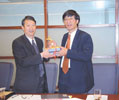 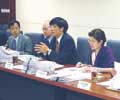 |
| A
meeting with NSFC in Hong Kong in October 2002 |
 NSFC / RGC Joint Research Scheme
NSFC / RGC Joint Research Scheme
 In November 1998, the RGC and the National Natural Science Foundation
of China (NSFC) agreed to launch a joint research scheme. The annual
total funding for the scheme is about HK$15 million, with the NSFC
contributing RMB 5 million and the Council contributing HK$10 million.
In November 1998, the RGC and the National Natural Science Foundation
of China (NSFC) agreed to launch a joint research scheme. The annual
total funding for the scheme is about HK$15 million, with the NSFC
contributing RMB 5 million and the Council contributing HK$10 million.
 The
scheme aims to promote collaboration in research between researchers
/ research teams in Hong Kong and their counterparts in mainland
China, in areas of common interest to complement each other’s
strengths. The
scheme aims to promote collaboration in research between researchers
/ research teams in Hong Kong and their counterparts in mainland
China, in areas of common interest to complement each other’s
strengths.
 The
scheme specifically aims to provide support for larger scale projects
that have clearly defined deliverables in the following six priority
areas: The
scheme specifically aims to provide support for larger scale projects
that have clearly defined deliverables in the following six priority
areas:
 Information Technology
Information Technology
 Life
Sciences Life
Sciences
 New
Materials Science New
Materials Science
 Marine
and Environmental Science Marine
and Environmental Science
 Chinese
Medicine Chinese
Medicine
 Management
Science Management
Science
 The
scheme operates differently from other joint schemes in that it
provides funding to support actual research expenses, instead of
only travel and subsistence. The
scheme operates differently from other joint schemes in that it
provides funding to support actual research expenses, instead of
only travel and subsistence.
 In 2002-2003, a total of 117 initial proposals were received. After
shortlisting, and in consultation with the NSFC, 37 proposals were
selected for formal application.
In 2002-2003, a total of 117 initial proposals were received. After
shortlisting, and in consultation with the NSFC, 37 proposals were
selected for formal application.
 Following a peer review process and detailed discussions by the
Joint Selection Committee comprising expertise from both the NSFC
and RGC, 14 proposals were finally selected for funding support.
A list of supported projects is in Appendix
K.
Following a peer review process and detailed discussions by the
Joint Selection Committee comprising expertise from both the NSFC
and RGC, 14 proposals were finally selected for funding support.
A list of supported projects is in Appendix
K.

Fulbright
Hong Kong Scholar Programme
 Starting
from the 2002-2003 academic year, the RGC has, in collaboration
with the US Consulate-General in Hong Kong, launched the Fulbright
Hong Kong Scholar Programme to support Hong Kong scholars to undertake
research work in the United States. Starting
from the 2002-2003 academic year, the RGC has, in collaboration
with the US Consulate-General in Hong Kong, launched the Fulbright
Hong Kong Scholar Programme to support Hong Kong scholars to undertake
research work in the United States.
 Selection
of scholars is based on academic peer reviews conducted under the
charge of the Fullbright Advisory Committee. Selection
of scholars is based on academic peer reviews conducted under the
charge of the Fullbright Advisory Committee.
 The
programme aims to award four fellowships, each at a rate of HK$350,000
for up to 10 months in each year. The
programme aims to award four fellowships, each at a rate of HK$350,000
for up to 10 months in each year.
 A
supplementary grant of up to HK$150,000 per application may be provided
to meet research expenses in justified cases. A
supplementary grant of up to HK$150,000 per application may be provided
to meet research expenses in justified cases.
 In
the pilot exercise in 2002-2003, the programme supported four local
scholars for roughly HK$1.5 million. They would be attached to prestigous
research institutions in the United States to complete their research
projects. A list of supported scholars is in Appendix
L. In
the pilot exercise in 2002-2003, the programme supported four local
scholars for roughly HK$1.5 million. They would be attached to prestigous
research institutions in the United States to complete their research
projects. A list of supported scholars is in Appendix
L.
 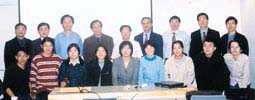 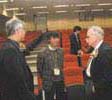 |
| Research
Postgraduate Conferences funded by the RGC |
Research
Postgraduate Students Conference / Seminar Grants
 The grant is provided to support and promote inter-institutional
and inter-disciplinary exchanges among postgraduate students of
the UGC-funded institutions, and to provide opportunities for postgraduate
students of these institutions to meet and interact with eminent
scholars from outside Hong Kong.
The grant is provided to support and promote inter-institutional
and inter-disciplinary exchanges among postgraduate students of
the UGC-funded institutions, and to provide opportunities for postgraduate
students of these institutions to meet and interact with eminent
scholars from outside Hong Kong.
 Specifically,
the scheme aims to facilitate the organisation of locally held inter-institutional
conferences / seminars targeted at postgraduate students. Specifically,
the scheme aims to facilitate the organisation of locally held inter-institutional
conferences / seminars targeted at postgraduate students.
 The grant is given in the form of travel grants which include the
travel and associated costs of invited visiting scholars to attend
and speak at conferences / seminars in Hong Kong.
The grant is given in the form of travel grants which include the
travel and associated costs of invited visiting scholars to attend
and speak at conferences / seminars in Hong Kong.
 Applications are received all year round and granted subject to
the availability of funds.
Applications are received all year round and granted subject to
the availability of funds.
 For 2002-2003, the Council approved five applications with a total
funding of HK$172,713. Brief details of the proposal are in Appendix
Q.
For 2002-2003, the Council approved five applications with a total
funding of HK$172,713. Brief details of the proposal are in Appendix
Q.

Earmarked Research Grant
2003-2004
 For 2003-2004, a provision of HK$577.9 million has been made available
for the ERG to be allocated via the Council, mainly in response
to competitive bids. For the 2003-2004 CERG exercise, the Council
has received a total of 1,878 project proposals, seeking some HK$1,813.7
million in project grants.
For 2003-2004, a provision of HK$577.9 million has been made available
for the ERG to be allocated via the Council, mainly in response
to competitive bids. For the 2003-2004 CERG exercise, the Council
has received a total of 1,878 project proposals, seeking some HK$1,813.7
million in project grants.
 As usual, preliminary consideration of the CERG applications will
be made by the four subject panels, to be assisted by international
expert assessors. Recommendations of the panels will be considered
by the Council at its meeting in June 2003.
As usual, preliminary consideration of the CERG applications will
be made by the four subject panels, to be assisted by international
expert assessors. Recommendations of the panels will be considered
by the Council at its meeting in June 2003.
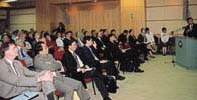
|
RGC
and panel members visit Hong Kong Baptist University in June
2002 as part of the Council’s annual visits to the eight
UGC-funded institutions |
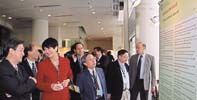 |
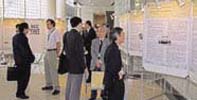 |
Other
Activities
The Council’s visiting programme: 2002
 The Council has a programme of making annual visits to the eight
UGC-funded institutions in Hong Kong. Generally, the Council plans
to visit one or two institutions each year. Members of the Council
and its subject panels visited Hong Kong Baptist University on 10
June 2002.
The Council has a programme of making annual visits to the eight
UGC-funded institutions in Hong Kong. Generally, the Council plans
to visit one or two institutions each year. Members of the Council
and its subject panels visited Hong Kong Baptist University on 10
June 2002.
 The programme included a wide range of presentations and discussions
on projects. The visit provided a useful forum for informal discussions
and collegial exchanges with academic staff and research students
from a cross section of the university’s departments, research
facilities and centres.
The programme included a wide range of presentations and discussions
on projects. The visit provided a useful forum for informal discussions
and collegial exchanges with academic staff and research students
from a cross section of the university’s departments, research
facilities and centres.
 Members were pleased to observe that the research atmosphere of
the university was active and healthy, and that both staff and students
were well supported and motivated to engage in research. Overall,
members were generally impressed by the significant progress which
the university had made since the last RGC visit in 1996.
Members were pleased to observe that the research atmosphere of
the university was active and healthy, and that both staff and students
were well supported and motivated to engage in research. Overall,
members were generally impressed by the significant progress which
the university had made since the last RGC visit in 1996.
 Similar visits will continue to be undertaken and the next visit
will be to The Hong Kong University of Science and Technology. Further
information on the background to the CouncilŐs visiting programme
is in Appendix
H.
Similar visits will continue to be undertaken and the next visit
will be to The Hong Kong University of Science and Technology. Further
information on the background to the CouncilŐs visiting programme
is in Appendix
H.
Co-operative
Research Centres Scheme
 The
Co-operative Research Centres (CRC) Scheme operated between 1993
and 2000 to promote collaboration in applied research between UGC-funded
institutions and industry. During the period, a total of 26 CRC
projects were supported for funding of which 13 projects were still
on-going as of December 2002. Progress of the funded projects has
been reasonably satisfactory. The
Co-operative Research Centres (CRC) Scheme operated between 1993
and 2000 to promote collaboration in applied research between UGC-funded
institutions and industry. During the period, a total of 26 CRC
projects were supported for funding of which 13 projects were still
on-going as of December 2002. Progress of the funded projects has
been reasonably satisfactory.
 The
RGC will continue to monitor progress of on-going projects up to
their completion. As part of its monitoring efforts, the CRC sub-committee
conducts regular on-site visits to on-going projects, and projects
which have been recently completed. The
RGC will continue to monitor progress of on-going projects up to
their completion. As part of its monitoring efforts, the CRC sub-committee
conducts regular on-site visits to on-going projects, and projects
which have been recently completed.
 From
these projects, the Council expects to see research outputs that
are highly research-relevant, and with strong potential for commercialisation. From
these projects, the Council expects to see research outputs that
are highly research-relevant, and with strong potential for commercialisation.
 The
Council’s Major Tasks for 2003
The
Council’s Major Tasks for 2003
 The following remain to be the Council’s major tasks for 2003:
The following remain to be the Council’s major tasks for 2003:
 |
Examine
ways and means to provide stronger support for research and
to improve the quality of research in Hong Kong. |
 |
Keep
a close watch on the development of the local research enterprise,
and help the Government to examine research needs of the higher
education sector in meeting new challenges. |
 |
Enhance
international research co-operation, as such co-operation is
important to the further upgrading and development of Hong Kong’s
research profile. Essential is the development of closer relations
with the Mainland and overseas countries. |

|
|

